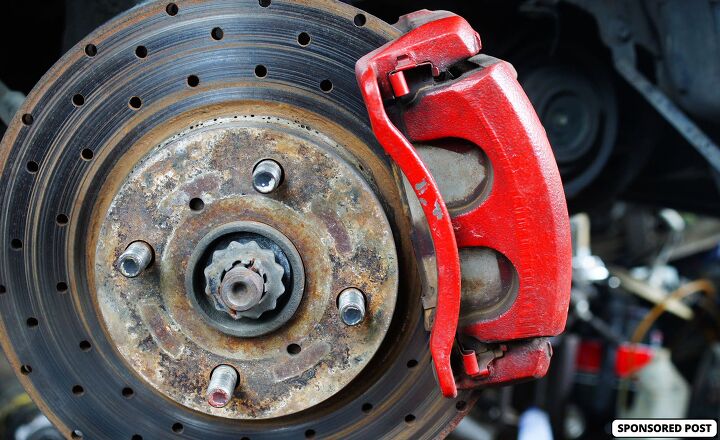Here’s Why You Need To Keep Your Brakes Clean

Regardless of what type of vehicle you drive, properly functioning brakes are vital to your safety and performance. But before working on your brakes, you need to properly clean them first. This is where Liqui Moly’s Brake & Parts Cleaner comes in.
We all remember the law of motion from high school science class. An object in motion by a force can be stopped only by an equal and opposite force. In the case of your vehicle, the force comes from the engine, and two forces are acting against the energy from the engine to slow and stop the vehicle - friction from the road and the air around the vehicle, and, more directly, the force exerted upon the brake system. Sure, the vehicle will eventually stop should you lay off the accelerator and let the friction from the road and air slowly bring the vehicle to a stop, but most of us want a more direct route, and this is where your brakes come in.
Brake systems also use friction to bring the vehicle to a halt…they just need a lot more of it. Brake systems come in two basic forms - disc and drum. Disc brakes are more common in current vehicle models. In these systems, a steel rotor is attached to an axle that spins with the axle. A stationary caliper presses two pads of multiple fibers against the disc, causing friction that slows and stops the vehicle. A drum brake is similar in that the drum rotates with the axle and brake shoes press outward against the drum to cause friction to stop the vehicle.
Why Clean Your Brakes?
What is common between the two types of brakes is that you have a metal surface, either the disc or the drum, which has pads or shoes made from multiple materials pressed upon it. This causes several things to happen. One, the surface of the disc or shoe heats up dramatically from the friction that can alter the surface of the disc or shoe over time depending upon how much friction is created. Two, the materials that the pads or shoes are made from are usually a combination of metallic or semi-metallic brake materials containing graphite, steel, iron, and copper, and these materials break down from heat and friction. Thirdly, the breakdown of the materials from all of the surfaces causes build-up on the brake systems that can cause a loss in braking performance. You can also find pads made from ceramic and even organic materials, which can both cause similar residue build-up.
This residue is commonly referred to as brake dust, and while that may sound like a fairly harmless thing, it causes a loss of performance to your brake system – and to your health (more on that later). This “dust” creates a secondary surface on your brake that is between the pad or shoe, and the disc or drum, that causes reduced contact between the two surfaces. When you reduce that contact, your brake performance suffers. But wait! There’s more. The materials from the pads can cause added corrosion to your surfaces, further decreasing brake performance. The added friction and build-up on the brake surfaces add more heat, which can have other bad effects. When a brake drum heats up, the surface of the drum moves away from the shoe, causing brake fade. You have to apply more pressure to the pedal to get contact, which further heats up the drum. With disc brakes, the disc expands in the caliper, causing less pressure to be required to apply braking force, but this leads to warping of the disc, that pulsating feel you get on the pedal, and a sharp decrease in performance.
Cleaning Time
While you might be temped to use compressed air to blow away the brake dust, that is a bad idea. Those tiny particles are highly harmful to your health if you breathe them in. Instead, spray the parts down with Liqui Moly Brake & Parts Cleaner to those particles don’t come in contact with your throat or airway.
Liqui Moly Brake & Parts Cleaner is very simple to use. It is a combination of select acetone-free solvents that quickly and efficiently dissolve oil, grease, resin, and tar-like residues from brake surfaces. It has a very low surface tension that penetrates into and behind deposits like brake dust, oil, grease, and other substances. It completely dissolves these materials, even in hidden areas. The cleaner will then evaporate, leaving behind a dry, dust-, grease-, and oil-free surface.
You start off by lifting your wheel off the ground, using a jack or lift. Loosen the lug nuts and remove your tire and wheel. Take the Liqui Moly Brake & Parts Cleaner and spray down the brake system. Make sure you rotate the disc or the drum to get the entire surface. Give it a moment to penetrate and then use a clean rag or shop towel to wipe down the entire surface and any other areas you sprayed. It is recommended that you clean any part of the brake you can see. Repeat the cleaning multiple times if need be.
The beauty of the Liqui Moly Brake & Parts Cleaner is that it can be used for any area in your vehicle that collects grease and other build-up. It is a very useful product that you will want to have on hand for all of your maintenance steps.
Stop the Squeal
To help avoid noisy brake squealing, you may want to add some Liqui Moly Ceramic Paste to the contact surfaces of the brake pad carrier next time you install new brake pads. Not only will you stop brake squealing before it starts, but it also helps protect against seizing and provides good corrosion protection. If you drive in areas where they salt the roads, the Anti-Squeal Paste can come in very handy. You can use it on the your disc brake linings, bolts, pins, contact points for drum brakes, along with other plug and screw connectors.
Don’t Forget the Brake Pins
While you are replacing your brake pads, you should give the guide pins of your brake calipers some TLC. Clean them up and re-lubricate them to they operate as they should so your brake pads wear evenly. Liqui Moly’s Brake Pin Lube is a synthetic lubricant designed specifically for the assembly and repair of brake systems that also keeps rubbers collars of your brake pins tight to prevent water from entering, helping to prevent corrosion.
NOTE: This is sponsored content produced in partnership with Liqui Moly.

More by AutoGuide.com Staff




































Comments
Join the conversation